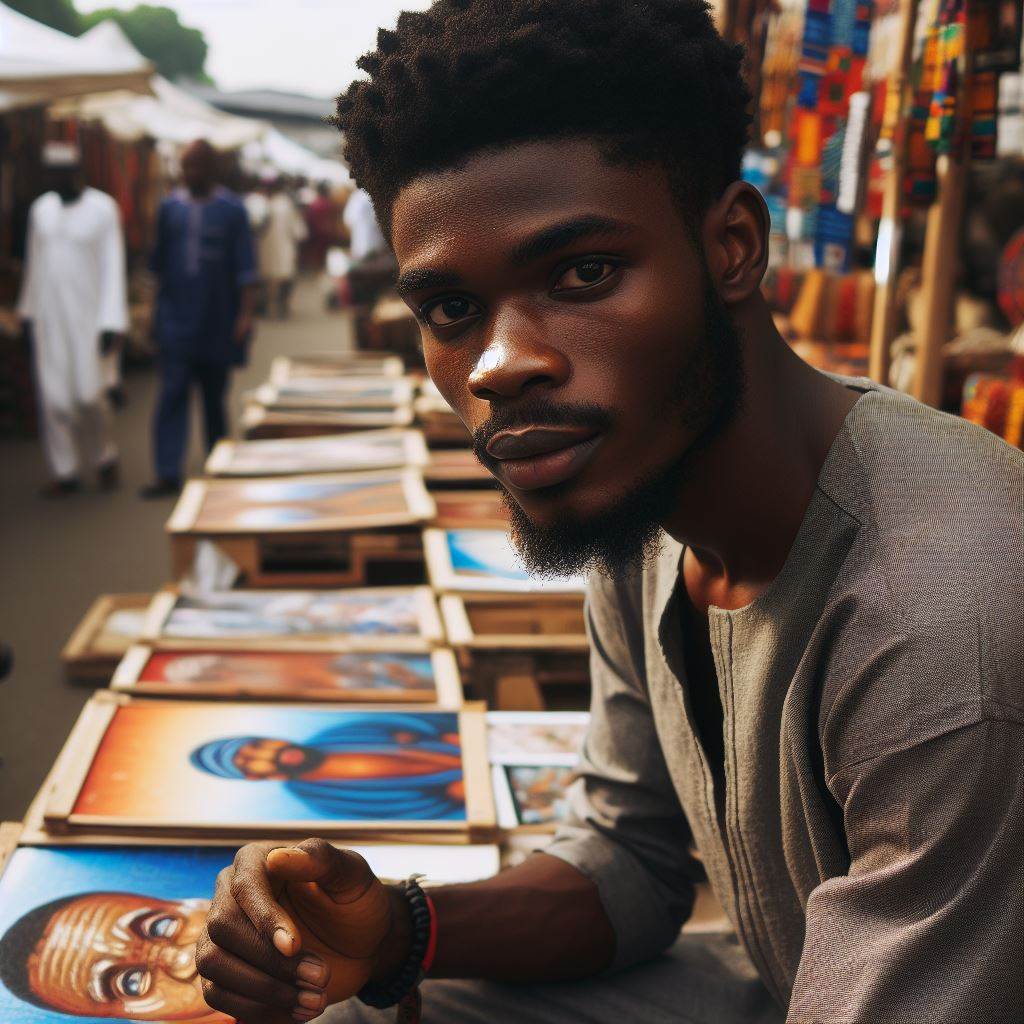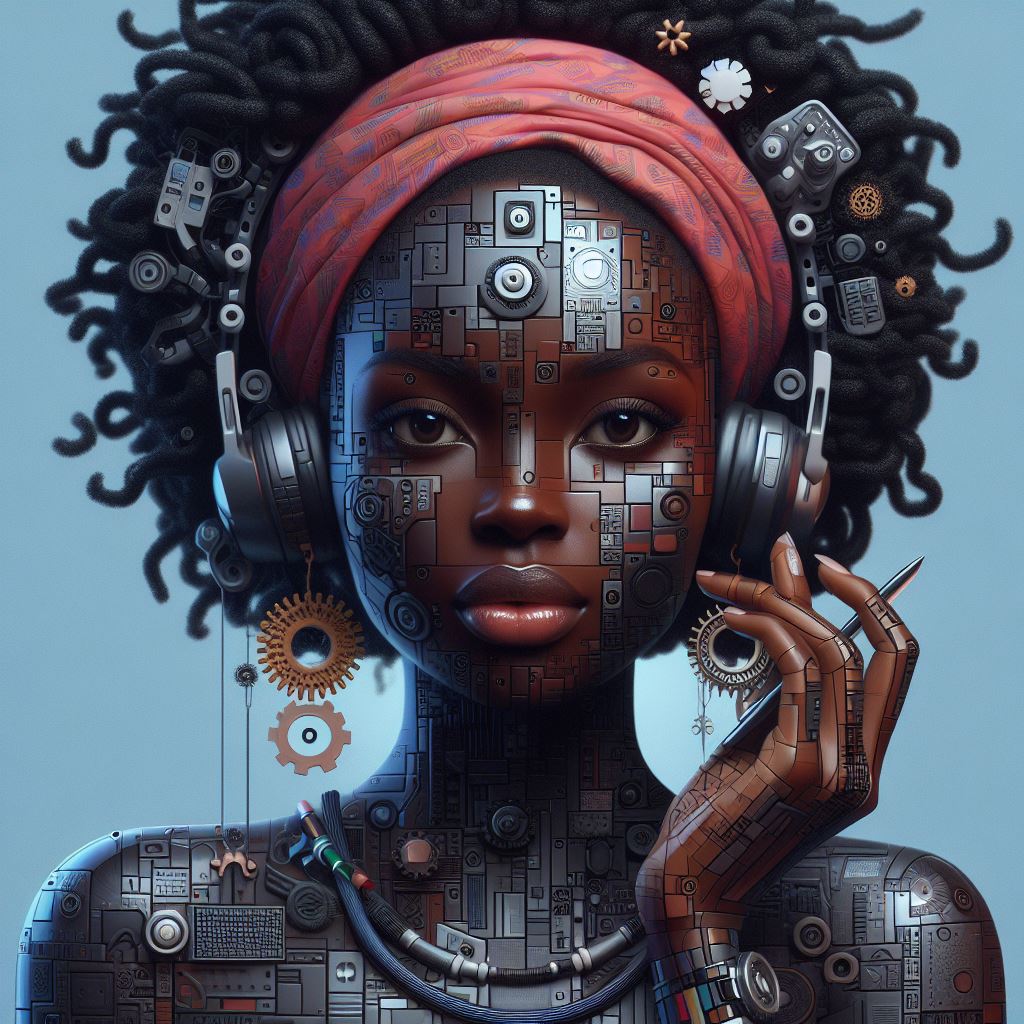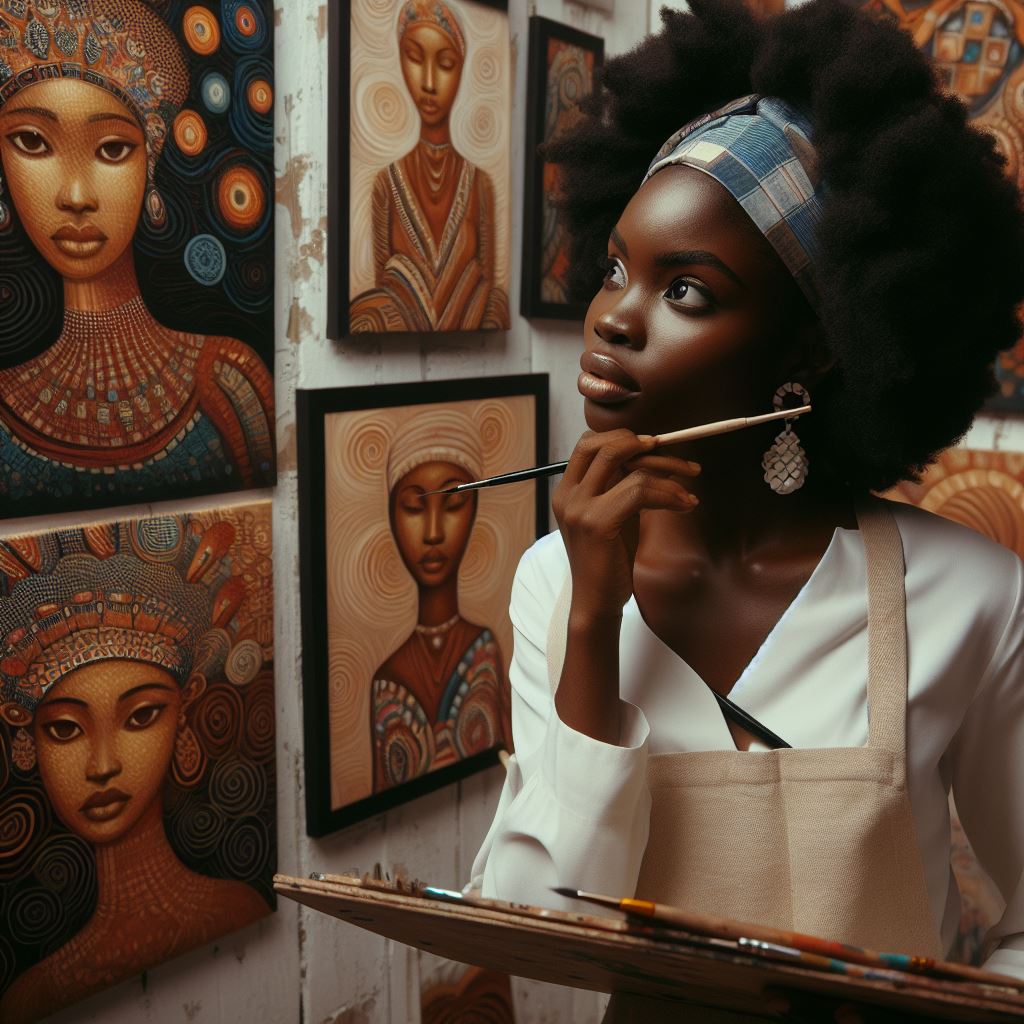Introduction
Art as activism is the dynamic fusion of creative expression and social change advocacy.
Nigerian artists embody this ethos, harnessing their craft to challenge injustices, advocate for marginalized voices, and drive societal transformation.
Through paintings, sculptures, performances, and other mediums, they confront issues like corruption, inequality, and human rights violations.
The role of artists in promoting social change is pivotal.
They serve as catalysts, amplifying the voices of the oppressed and shedding light on overlooked realities.
By provoking thought, stirring emotions, and fostering empathy, artists compel audiences to confront uncomfortable truths and take meaningful action.
Art’s significance in addressing societal issues cannot be overstated.
It transcends language barriers, cultural divides, and socio-economic boundaries, making complex issues accessible and relatable.
Through their work, artists challenge norms, inspire dialogue, and foster empathy, creating a ripple effect of awareness and activism that reverberates far beyond gallery walls.
History of Activism in Nigerian Art
Brief Overview of Activism in Nigerian Art
Nigerian art has a rich history of activism, spanning from pre-colonial resistance to contemporary struggles against social and political injustices.
Key Nigerian Artists Who Have Used Their Work for Activism
Throughout history, several Nigerian artists have distinguished themselves as champions of activism.
Figures like Ben Enwonwu, known for his depictions of Nigerian independence leaders, and Bruce Onobrakpeya, renowned for his anti-colonial prints, laid the groundwork for future generations of activist artists.
In the post-independence era, literary giants like Chinua Achebe and Wole Soyinka expanded the scope of activism through their written works, challenging colonial narratives and advocating for social change.
Contemporary Nigerian artists continue this tradition of activism, using their platforms to address pressing issues such as corruption, inequality, and human rights abuses.
Ngozi Schommers, through her feminist art, sheds light on gender inequality, while Victor Ehikhamenor’s work confronts environmental degradation and political corruption.
Impact of Their Art on Society and Politics
The impact of Nigerian artists’ activism reverberates throughout society and politics. Their art serves as a powerful tool for raising awareness, sparking crucial dialogue, and mobilizing communities to action.
By challenging entrenched power structures and advocating for justice, Nigerian artists provoke critical thinking and inspire collective action.
Their work not only shapes public discourse but also influences policy decisions, driving societal transformation and advancing the cause of social justice.
In essence, the legacy of activism in Nigerian art is a testament to the enduring power of creativity in effecting change.
From pre-colonial resistance to contemporary struggles, Nigerian artists continue to use their voices to challenge oppression and shape a more just and equitable society.
Contemporary Nigerian Artists Leading Change
In recent years, a new wave of contemporary Nigerian artists has emerged who are using their art as a powerful tool for activism and social change.
These artists are not only creating visually striking masterpieces but also using their platform to raise awareness about important social issues and promote positive change in their communities.
Njideka Akunyili Crosby
Njideka Akunyili Crosby is a Nigerian-born visual artist known for her intricate and powerful paintings that blend Nigerian and American influences.
Her work often explores themes of cultural identity, immigration, and the complexities of the diasporic experience.
Through her art, Crosby challenges stereotypes and celebrates the richness of Nigerian culture, while also shedding light on issues such as race, gender, and politics. She has received widespread acclaim for her work and has been recognized for her contributions to contemporary art.
Laolu Senbanjo
Laolu Senbanjo is a Nigerian artist and musician who is known for his unique style of body painting and visual art. His work is heavily influenced by his Yoruba heritage and often incorporates traditional African symbols and patterns.
Senbanjo uses his art to promote cultural pride and celebrate African heritage, challenging stereotypes and misconceptions about Africa.
He has collaborated with major brands and celebrities, using his platform to raise awareness about issues such as cultural appropriation and representation.
Peju Alatise
Peju Alatise is a Nigerian artist and author whose work addresses issues of gender, feminism, and social injustice. Her art often explores the experiences of women and girls in Nigerian society.
Shining a light on the challenges they face and advocating for gender equality.
Alatise’s powerful sculptures and installations prompt viewers to think critically about social issues and inspire conversations about gender norms.
She has been recognized for her powerful and thought-provoking work, which challenges societal norms and promotes positive change.
Victor Ehikhamenor
Victor Ehikhamenor is a Nigerian artist, writer, and photographer known for his bold and vibrant paintings and mixed-media works. His art often explores themes of identity, history, and colonialism, shedding light on the complexities of Nigeria’s past and present.
Through his art, Ehikhamenor challenges viewers to confront uncomfortable truths and engage in difficult conversations about Nigeria’s history and society. He uses his platform to advocate for social justice and raise awareness about issues such as corruption, inequality, and human rights.
Ndidi Dike
Ndidi Dike is a Nigerian artist and curator whose work addresses issues of urbanization, environmental degradation, and social change. Her art often incorporates found objects and materials, creating powerful installations that reflect the challenges facing Nigerian society.
Dike’s work challenges viewers to think critically about their relationship to the environment and the impact of urban development on local communities.
She uses her art to advocate for sustainable development and raise awareness about the importance of preserving Nigeria’s cultural heritage and natural resources.
Basically, these contemporary Nigerian artists are leading change through their powerful art and activism.
Through addressing social issues and advocating for change, they make a difference in communities, inspiring others to act. Through their work, they are raising awareness, provoking thought, and promoting a more inclusive and just society.
Read: Research Areas in African and Asian Studies
Themes and Issues Addressed by Nigerian Artists in Their Activism
Nigerian artists are at the forefront of using their creative expressions to address pressing societal issues. They engage with a diverse range of themes, reflecting the complexities and challenges of contemporary Nigerian society.
One common theme is political corruption, which artists critique through satirical portrayals of politicians and government officials.
Another prevalent issue is gender inequality, with artists advocating for women’s rights and empowerment through their work.
Environmental degradation and climate change also feature prominently, as artists raise awareness about the ecological crisis facing Nigeria and the world.
Different Artistic Mediums and Techniques Used to Convey Messages
In their activism, Nigerian artists employ a wide array of artistic mediums and techniques to convey their messages effectively.
Traditional mediums such as painting, sculpture, and printmaking are commonly utilized to create powerful visual statements. Performance art and installation art offer immersive experiences that engage viewers on a deeper level.
Digital art and multimedia installations leverage technology to reach wider audiences and spark conversations online.
Regardless of the medium, artists frequently use symbolism, metaphor, and allegory to convey complex ideas and emotions, prompting critical reflection.
Power of Visual Storytelling in Sparking Conversations and Provoking Thought
Visual storytelling is a cornerstone of Nigerian art activism, allowing artists to communicate powerful narratives that resonate with viewers on an emotional level.
Artists capture social issues’ essence through evocative imagery and compelling compositions. They invite viewers to empathize and consider change.
Street art emerges as potent visual storytelling in Nigeria. Graffiti murals and public installations serve as statements of resistance and solidarity.
By harnessing the power of visual storytelling, Nigerian artists provoke thought, inspire action, and contribute to the ongoing struggle for social justice and equality.
Read: How to Open a Beauty Salon in Nigeria: Step-by-Step

You Might Also Like: Philosophy and Ethical Issues in Nigeria
See Related Content: Women in Nigerian History & Strategic Studies
Challenges Faced by Activist Artists in Nigeria
Artists in Nigeria encounter numerous challenges using art for activism, hindering their ability to effectively promote change.
From censorship to government crackdowns, activist artists in Nigeria navigate a complex landscape in their pursuit of creative expression and social justice.
Censorship
One of the most significant challenges faced by activist artists in Nigeria is censorship. The government often imposes restrictions on artistic content that is deemed controversial or critical of the status quo.
This censorship not only stifles artistic freedom but also limits the impact of activism through art.
Government Crackdowns
Activist artists in Nigeria also face the risk of government crackdowns and persecution for their work.
The authorities may target artists who challenge the political establishment or raise awareness about sensitive issues such as corruption, human rights abuses, and social inequalities.
This threat of reprisal can deter artists from speaking out and engaging in activism through their art.
Limited Resources
Many activist artists in Nigeria struggle with limited resources and support, which can hinder their ability to create and exhibit their work.
Limited funding, materials, and exhibition opportunities hinder artists. They struggle to reach wider audiences and effect meaningful change.
Social Stigma
Engaging in activism through art can also subject artists to social stigma and ostracization. Some members of society may view activist artists as troublemakers or agitators, leading to negative perceptions and even threats to their safety.
This societal pressure can have a chilling effect on the willingness of artists to tackle sensitive issues through their art.
Importance of Freedom of Expression
Despite the challenges faced by activist artists in Nigeria, the fight for freedom of expression and artistic liberties remains crucial.
Artistic expression is a fundamental right that enables artists to voice their perspectives, challenge the status quo, and advocate for positive change in society.
Protecting this freedom is essential for fostering a culture of creativity, diversity, and social progress.
In general, activist artists in Nigeria confront various obstacles and risks in their quest to use art as a powerful tool for social change.
Artists address censorship, government crackdowns, limited resources, and social stigma. They overcome challenges, making a positive impact through creativity and activism.
Read: Day in the Life of a Nigerian Beauty Therapist
Find Out More: Study Abroad Programs for Nigerian Language Students
Delve into the Subject: Ethics in African and Asian Studies Research
Delve into the Subject: Strategic Studies: Policy Analysis in Nigeria
Impact of Activist Art on Nigerian Society
Activist art in Nigeria is a dynamic force, transcending mere aesthetics to become a powerful catalyst for societal change. Through their creative endeavors, Nigerian artists wield their talents to influence public opinion, shape policy, and foster dialogue on critical social issues.
Analyzing the Influence of Activist Art on Shaping Public Opinion and Influencing Policy
Activist art serves as a potent tool for shaping public opinion. Artists capture attention through evocative imagery, compelling narratives, and thought-provoking messages. They compel audiences to confront societal issues.
This engagement with art sparks conversations, provokes introspection, and challenges entrenched beliefs, ultimately shaping public discourse.
Transform Your Career with Expert Guidance
Get personalized mentorship consulting that’s tailored to your unique path. Our expert advice is actionable and exclusive.
Get StartedMoreover, activist art has the potential to influence policy decisions. Artists bring attention to social injustices, advocating for change through their work. They pressure policymakers to address systemic issues and enact reforms.
Art’s visual impact conveys issue urgency and gravity, surpassing traditional advocacy methods. It’s a potent force for policy change.
Discussing How Art Can Stimulate Dialogue, Challenge Stereotypes, and Promote Social Justice
Art serves as a medium for stimulating dialogue and challenging stereotypes. Through their creative expression, artists provide alternative perspectives, challenge dominant narratives, and amplify the voices of marginalized communities.
By depicting diverse experiences and realities, art fosters empathy and understanding, breaking down barriers and promoting inclusivity.
Furthermore, activist art is a powerful tool for promoting social justice. By highlighting the struggles and injustices faced by marginalized groups, artists bring attention to systemic inequalities and advocate for change.
Through their work, they inspire action, mobilize communities, and contribute to the advancement of social justice causes.
Providing Examples of Successful Campaigns or Movements Sparked by Activist Art
One prominent example of the impact of activist art in Nigeria is the #EndSARS movement.
Nigerian artists amplified protesters’ voices, documenting experiences through visual art, music, and performance. They played a pivotal role in mobilizing communities and sparking change.
These creative expressions raised awareness about police brutality and mobilized a global community to demand accountability and systemic change.
Similarly, campaigns like “Bring Back Our Girls” have leveraged art to raise awareness about issues such as gender inequality and insecurity. Through powerful imagery and advocacy efforts, artists have compelled policymakers to take action and address these pressing issues.
In review, activist art in Nigeria is a transformative force, driving societal change and promoting social justice.
Nigerian artists wield creativity and advocacy, challenging injustices, advocating for marginalized communities, and shaping a fairer future. They lead by example, inspiring change and fostering inclusivity through their art.
Read: Cosmetology and Beauty Therapy Scholarships in Nigeria
Learn More: Cultural Heritage and Its Study in Nigerian Universities
Find Out More: How to Market Your Film in the Nigerian Market
Conclusion
In concluding our exploration of art as activism in Nigeria, it’s evident that this intersection is not merely a trend but a burgeoning movement.
Nigerian artists have become vanguards of societal transformation, using their creative expressions as potent tools for advocacy and change.
The future of art as activism in Nigeria holds boundless potential.
As societal issues persist, artists must amplify marginalized voices, challenge oppressive systems, and inspire collective action through their work.
Art has proven time and again its ability to transcend barriers, evoke emotions, and prompt critical reflection, making it a formidable force for driving social change.
Therefore, it’s crucial to continue supporting Nigerian artists who courageously lead the charge for a better future.
Investing in their endeavors, amplifying their voices, and championing their causes acknowledges invaluable contributions and fosters societal progress.
Together, let’s empower Nigerian artists to continue shaping a more just, equitable, and compassionate world through their art and activism.




